By Laura Baerwolf, Director of Operations, Mona Foundation
The year 2020 will forever be associated with the COVID-19 pandemic. It brought the world to a halt in a matter of months, changed the way we live, work and play, and made clear that what impacts one impacts all. As of this writing, more than 4.4 million people have lost their lives to COVID-19, millions more have been pushed into extreme poverty, and millions of students are without access to continuing education.
“What started as a public health catastrophe became an economic crisis, a food crisis, a housing crisis, and an educational crisis … any of the gains made in the past 25 years across development indicators poverty, health, equality, and education — have been lost.”
— Melinda Gates, Co-chair, Bill and Melinda Gates Foundation
For Mona Foundation, a nonprofit that supports grassroots educational programs in economically disadvantaged communities around the world, 2020 began with great uncertainty and concern for the staff, students, and families of our partner organizations, many of which are based in areas where social distancing is impossible and access to healthcare is non-existent. But as we began to witness their resilience in mobilizing to face a devastating pandemic and their indomitable resolve to contribute to the social good, we were also uplifted, moved, and inspired. Our long-term partnerships, focused on building the capacity of local communities through the twin engines of education and gender equality, had prepared them to create all that was needed to sustain their trajectory towards a better future.
At the onset of the pandemic, Mona immediately consulted with each of our 19 partners organizations in 12 countries to learn what they needed to navigate the crisis. Their responses ranged from having the means to transition to online learning to providing basic life needs for their staff and school communities. We quickly conveyed these needs to our supporters and ran special campaigns to raise the emergency funds, providing updates every few months.
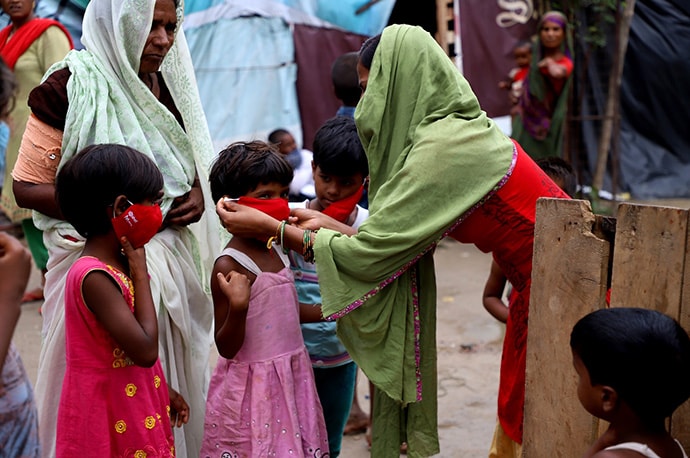
Photo credit: Mona Foundation. Study Hall Educational Foundation (India) mother putting a mask on a child.
The progress that unfolded as a result was truly remarkable. By the end of 2020, our collective student reach had grown by more than 400% (from 430,000 to nearly 2.3 million) across 3,200 communities in 12 countries. Of the 19 schools and programs run by our partner organizations, 17 of them transitioned to online learning. The one-room schools we support in India’s urban slums and rural villages scaled from 33 to 63 centers through the introduction and use of basic technologies. And many of our partners quickly developed local outreach programs, engaging their students, staff, teachers, and local businesses to provide over 163,000 people with necessities like soap, masks, or daily meals, and information on public health measures and access to relief agencies.
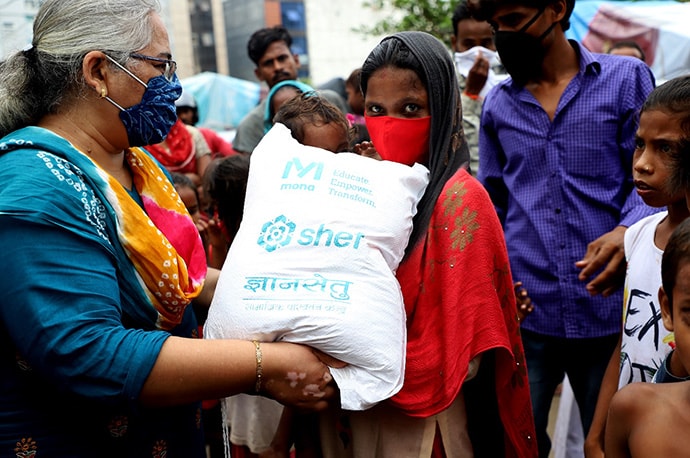
Photo credit: Mona Foundation. Study Hall Educational Foundation (India) rations distribution.
We attribute the achievement of these unexpected results to Mona’s approach to development which, from our experience over the past 22 years, has proven to be unique, effective, efficient, and transformative:
- We focus on education and gender equality to address the root causes of extreme poverty. The World Bank and UNICEF clearly confirm: “Education is a powerful driver of development and one of the strongest instruments for reducing poverty and improving health, gender equality, peace, and stability.” Girls’ empowerment not only helps guarantee basic rights for half the world’s people, it’s also one of the most effective ways to build vibrant communities. Educated women tend to be more informed about nutrition and healthcare, marry at a later age, have fewer and healthier children, are more likely to earn higher incomes, and put that money back into their families and
- We are community-led. We partner with grassroots organizations in the belief that progress is sustainable only when it begins locally and is led by members of the community. Every culture on the planet holds positive and negative opinions about education and the equality of women, and every community has its own set of unique challenges and solutions. Local people are in the best position to identify, analyze, and address the needs of their communities in light of local realities, aspirations, and initiatives.
- We focus on capacity building to support our partner organizations and the students, families, and communities they serve in learning to assess and respond to their own critical needs. Capacity building is a long-term process that involves learning to work towards goals in a systematic way, to build on strengths, to foster collaborative relationships in service of the common good, and to apply lessons learned through experience. It taps into the vast capabilities of the local people and empowers them with the knowledge, qualities, and skills needed to improve their own lives and the lives of others in their community.
- We provide long-term support to enable, sustain, and scale positive change. Long-term support enables our partner organizations to learn through experience over time, to continually build capacity at the individual, organizational, and community levels, to address needs with increasingly more complex solutions, and to ultimately scale their services and reach.
- We build trust & collaborate. Mona’s relationship with its partner organizations is one of trust, mutual respect, and reciprocity embedded in a humble culture of learning. This fundamental shift from the traditional top-down approach supports collaboration and openness in decision-making and fosters an environment in which innovative programs can be envisioned and implemented.
- We incorporate ethics and selfless service. We believe the purpose of education is to develop global citizens who are empowered to improve their own lives while also contributing to the social good. Such positive change is only possible when education supports students to develop their moral capabilities (such as integrity, trustworthiness, justice, and equality) and integrate service to others as a way of life.
- We catalyze and accelerate change. We bring together a global community of change makers: donors, nonprofits, and businesses; and work with proven local partners to address the root causes of poverty and sustain individual and social transformation.
The collective experience of our partner organizations over the past 18 months offers much insight into how Mona’s long-term partnership model, with its focus on education and gender equality as the twin engines of sustained change, have led to an exceptional set of achievements in seemingly unsurmountable circumstances. The following are but two of these stories.
Study Hall Educational Foundation (India)
In 2020, Study Hall Educational Foundation (SHEF) vastly scaled its reach from 406,000 to 2.2 million students. The capacity to accomplish such a feat in the middle of a global pandemic began with SHEF’s vision in 2005 to improve the quality of education in India’s slum and rural schools by using simple video technology to share private school resources with less fortunate schools.
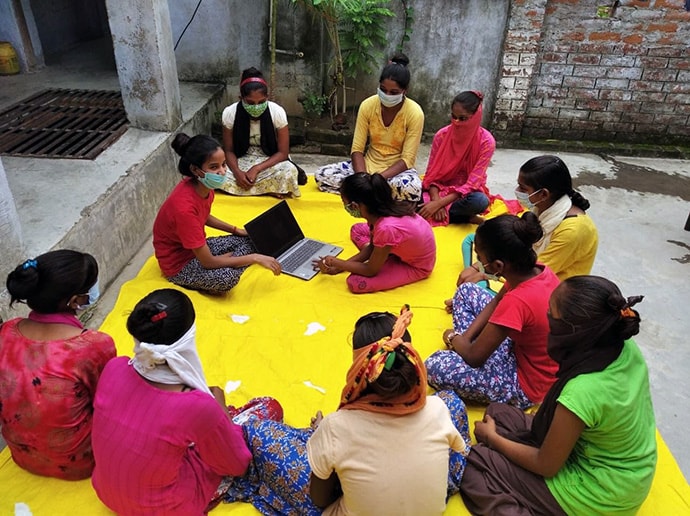
Photo credit: Mona Foundation. Study Hall Educational Foundation (India) remote learning.
In collaboration with Microsoft Research India and Princeton University professor Randy Wang, SHEF started a new initiative, Digital Study Hall (DSH), to create videos of live classroom sessions taught by the best, most qualified teachers and provide them free of charge to the teachers and students in poor rural schools. The videos, reinforced with ongoing teacher trainings, passed on best practices and assisted the local teachers to provide quality instruction to their students.
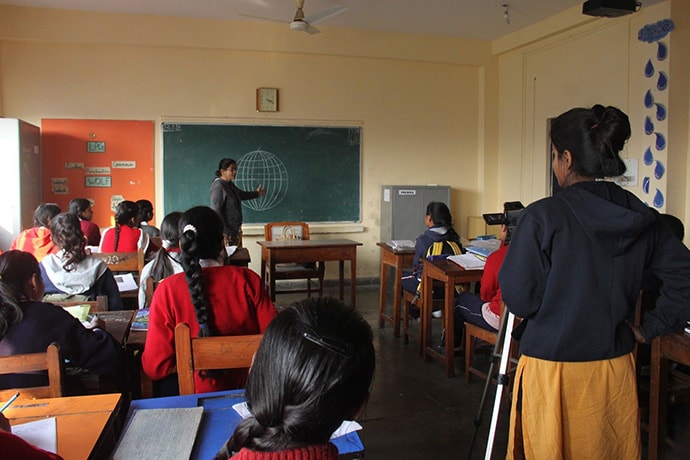
Photo credit: Mona Foundation. Study Hall Educational Foundation (India) creating videos of live classroom settings.
When Mona began supporting the program in 2008, Digital Study Hall was serving a small group of 23 government schools in Uttar Pradesh. By 2015, it had grown to serve nearly 800 schools with 1,100 high-quality video lessons uploaded to YouTube for greater access. By 2019, their DSHOnline channel had 89,700 subscribers and about 2,000 video lessons covering the state curriculum, special education, digital stories, and teacher training workshops.
In May 2020, India went into lockdown and quickly closed all schools to prevent the spread of COVID-19. With no other way to continue learning, teachers and students from four Indian states, Nepal, and Bhutan flocked to the DSH platform for online education, resulting in a 26% increase in subscribers and more than 2 million unique users over the course of the year.
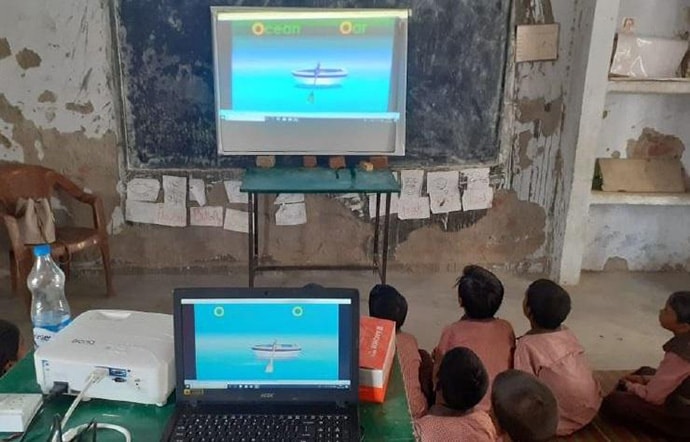
Photo credit: Mona Foundation. Study Hall Educational Foundation (India)
With ongoing support from Mona for more than a decade, Digital Study Hall now operates in 2,320 schools. The capacity they have built over the years is representative of all SHEF programs that Mona supports. In addition to transitioning nearly all their students to online learning, SHEF’s COVID response also included distributing 29,000 masks, 1,150 bags of food, and 5,000 soap packs in the most destitute of the slum and rural communities they serve, as well as educating them on health measures and providing access to health and food relief agencies and legal resources to prevent violence against women. This year, Mona is working with SHEF to provide relief funds for food and shelter for 50+ families who have lost their sole breadwinner to COVID-19.
The COVID-19 lockdown launched us into an unknown space – children weren’t accessible and the teachers who had lived their lives teaching in classrooms were locked at home. Perhaps the greatest learning from this crisis has been the realization that technology is a great tool which we have not leveraged enough…. We must empower our teachers to reinvent their roles from that of transferring information to enabling learning through diverse high-tech and low-tech sources.”
— Urvashi Sahni, Founder and CEO, Study Hall Educational Foundation
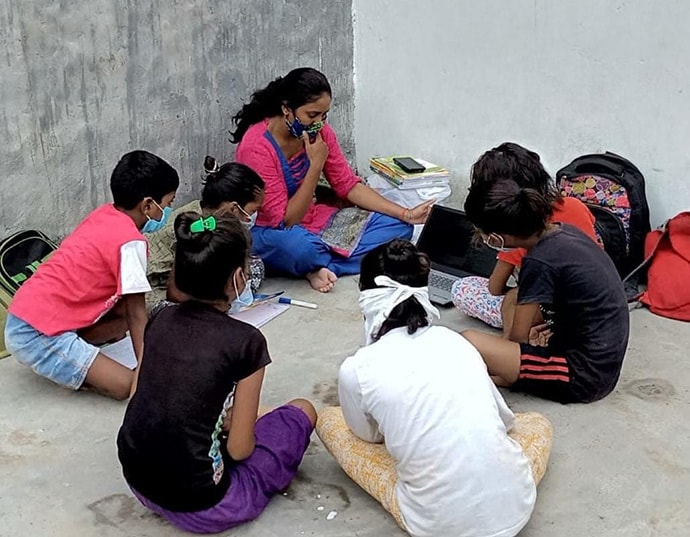
Photo credit: Mona Foundation. Study Hall Educational Foundation (India) remote learning.
Badi School (Panama)
The Badi School was one of only 120 schools in Panama (out of 6,000 total) to be certified for online educational instruction by the government following the country’s 2020 lockdown. Despite very difficult circumstances, the school quickly built an online platform, trained its teachers on its use, and transitioned all 450 students to online learning.
The school’s ability to take this step began in 1993 when it first started out as an afterschool tutoring program in the carport of the Torres family’s small, rented trailer in a poor, rural neighborhood with no schools nearby. Mrs. Torres started out by simply teaching her own two young sons. When they begin to thrive, other families in the neighborhood noticed and asked if they could bring their children. Soon the carport was filled with Kindergarteners. The following year, the Torres’ added a 1st grade class in their living room and welcomed new Kindergarteners from the neighborhood into the carport. Seeing how important the school was to her community, Mrs. Torres decide to continue her own education and began teaching formally. The community was inspired and gave its full support. More grades were added to the school and the Torres home became an epicenter of activity.
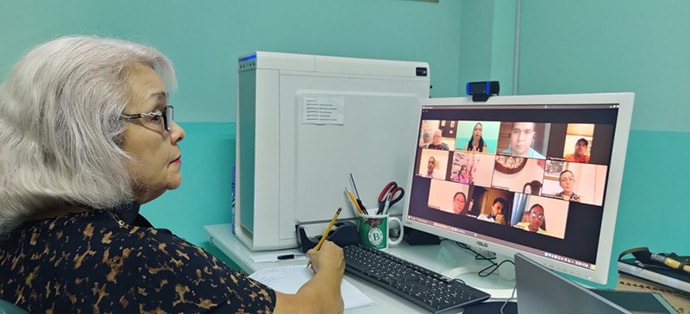
Photo credit: Mona Foundation. Mrs. Torrez in Zoom meeting.
Mona’s partnership with Badi School began in 2004 when it had grown to a K-3 school. With this added and consistent support, the school continued to build its capacity to undertake more complex initiatives and built additional classrooms, a school library, and a computer lab in 2008. During this period Mona heavily supported Badi’s infrastructure expansion and provided all the resources it needed to grow into a K-12 school.
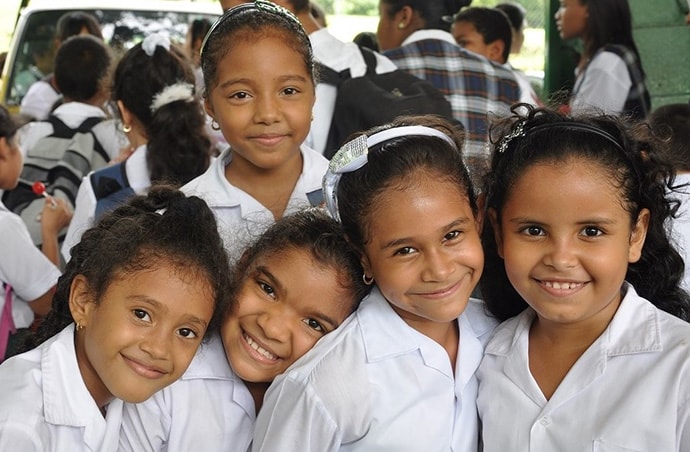
Photo credit: Mona Foundation. Badi School students.
One year, Mr. and Mrs. Torres noted the community had a high rate of teen pregnancies (70%) and decided to implement a girls’ empowerment/virtues program, entirely supported by Mona Foundation, to help girls see themselves as equal contributing members of society. It also encouraged them to join its Arts program to express themselves and discover their hidden talents. Within 4-5 years, the school reported zero incidents of teen pregnancy among its students. The impact was so significant that the Ministry of Education printed Badi’s entire program in the Daily Newspaper so others could implement it.
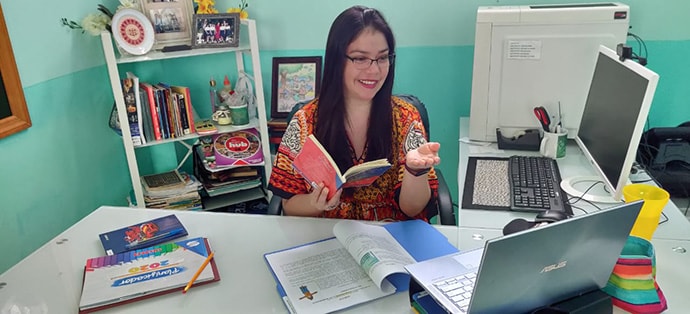
Photo credit: Mona Foundation. Badi School – Mavis Reyes teaching a Virtues class online.
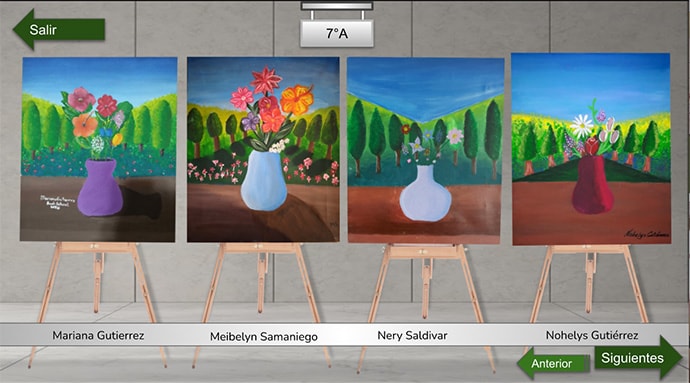
Photo credit: Mona Foundation. Badi School virtual art gallery.
Today Badi School is financially self-sufficient (our support is limited to providing extracurricular enrichment programs), is a highly regarded K-12 institution serving 450 students (57% girls). It is well known throughout Panama and internationally for its excellent academic education as well as its outstanding programs in arts, music, technology, and community service. The school has a 100% graduation rate and its graduates regularly receive full scholarships to top universities in Panama and the United States.
COVID-19 closed all schools in Panama just a few days after the 2020 school year began. With Mona’s support of Badi School’s urgent needs for access to computers, cell phones, and online network, the school created and launched an online platform over the first weekend, enabling a fairly seamless transition to online learning. Two slogans spread quickly among the teachers and students: “Stay at home” and “Education does not stop”.
“At the end of the year, we all understand that the “Badí Online System” is not software, nor is it a program, a computer, or a set of discs and cables…. Rather, it is an extraordinary effort by everyone, starting with all the little children who recorded videos requesting our society to “stay home”, to the teachers who transformed their vocation through a screen, to the parents and students who patiently discovered that learning is everyone’s task. This is a system… we all work together as one.”
— Alex Torres, Badi School, Panama
Mona Foundation partners with grassroots initiatives around the world that educate children and empower women and girls, enabling them to transform themselves and their communities and lift them out of poverty. They currently support 23 partner organizations in 14 countries. Mona was recognized as a Finalist at this year’s Catalyst 2030 Awards for its role in catalyzing and accelerating systems change in education.